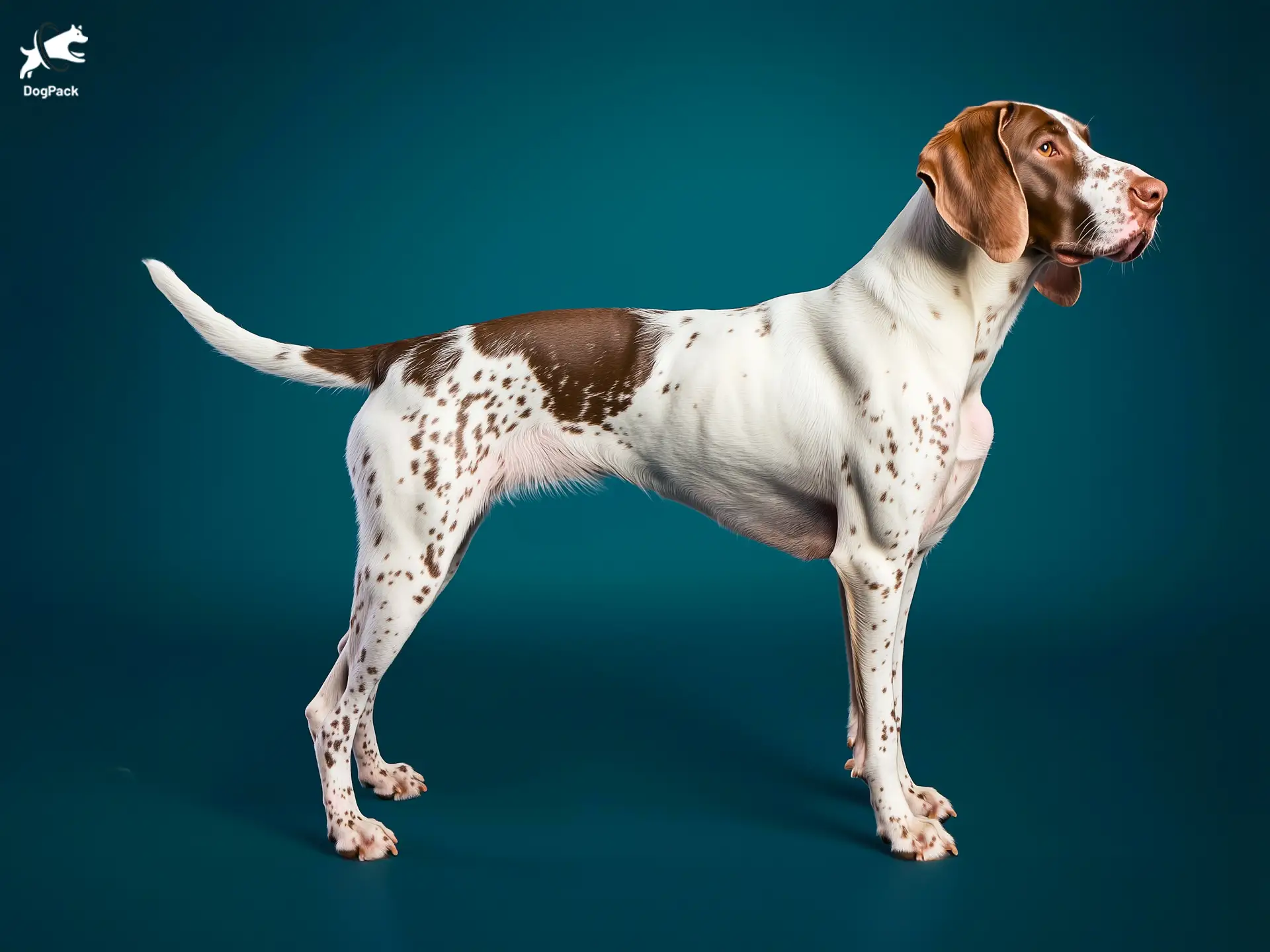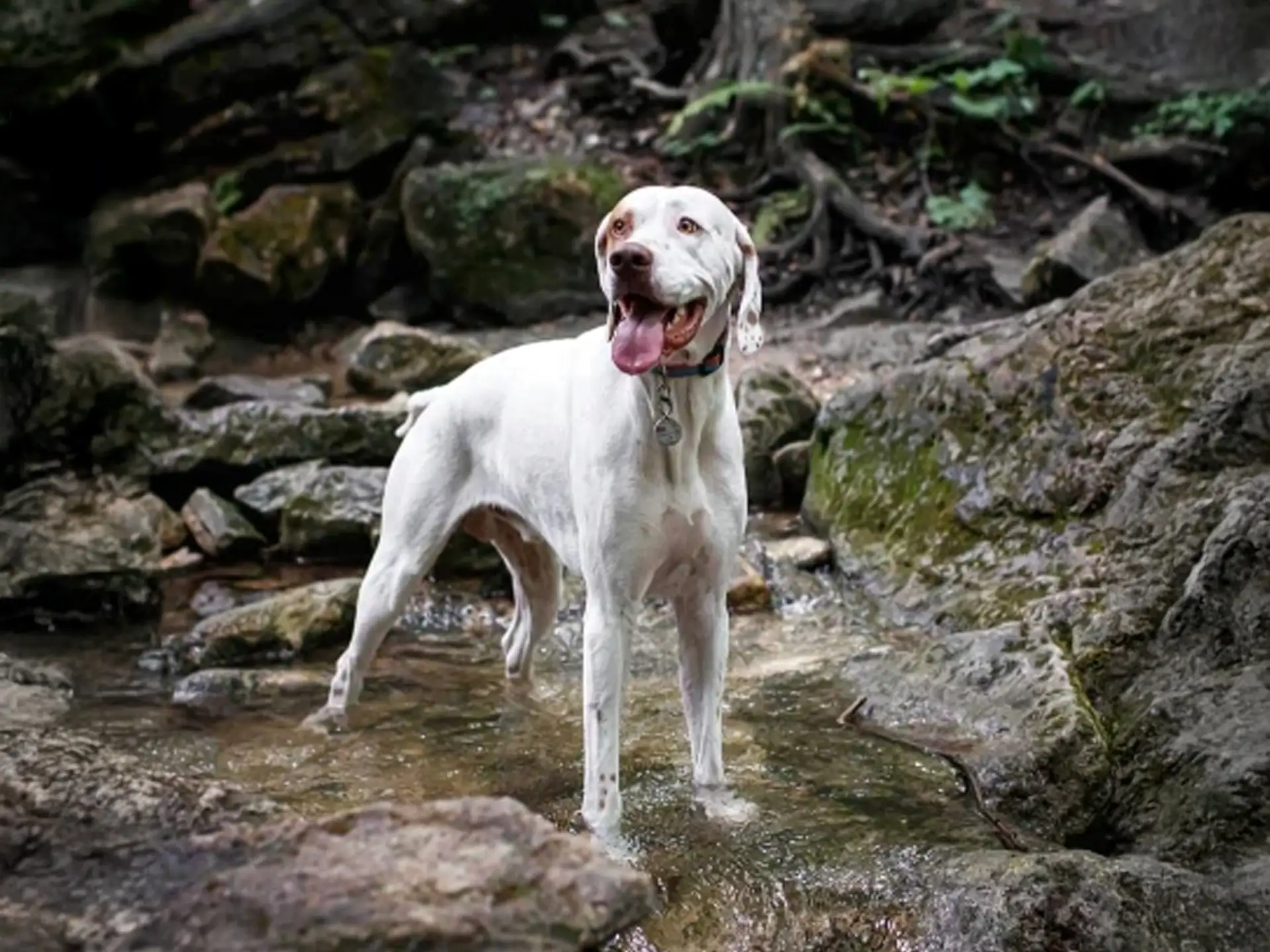English Pointer Dog Breed Info & Overview
Ever watched a dog freeze mid-step, tail rigid, nose forward, as if pointing out hidden treasure? That’s the classic English Pointer for you. Renowned for their hunting prowess, these athletic and graceful dogs are not just skilled in the field but also make affectionate family companions for those who can match their energy levels.
Characteristics
Pictures
Breed History
The English Pointer’s story starts in 17th-century England, where breeders developed it as a premier hunting dog. Combining the speed of Greyhounds, the endurance of Foxhounds, and the scent-tracking skills of Bloodhounds, they created a highly skilled and agile hunting companion.
Named for its iconic “pointing” stance, the breed would freeze mid-step, lifting one paw, pointing its tail, and focusing its gaze to indicate the presence of game birds. This distinctive stance made Pointers invaluable for hunters before firearms were widely used.
As the breed gained popularity, English Pointers became a staple among sportsmen across Europe. Their skill, speed, and dedication established them as one of the most respected hunting dogs, and their popularity eventually spread globally among hunting enthusiasts and families alike.
Temperament, Personality
English Pointers are known for their friendly and balanced temperament. These dogs form strong bonds with their families and are happiest when surrounded by people they trust. Their high energy levels and enthusiasm make them an ideal fit for active households that can keep up with their pace.
With children, Pointers are usually affectionate and gentle. However, their energy may be a bit overwhelming for very young kids, so supervised play is recommended. Their playful spirit and endurance make them great companions for older children who enjoy outdoor activities.
When it comes to other pets, English Pointers generally get along well if socialized early. However, their strong prey drive may be triggered by small animals, so careful introductions and supervision are essential in multi-pet households.
Physical Characteristics
The English Pointer is an athletic and well-built dog, standing 23 to 28 inches tall and weighing between 45 to 75 pounds. Their lean, muscular bodies are designed for speed and endurance, perfect for long hours in the field.
Their short, dense coat is sleek and easy to maintain. It often comes in classic hunting colors, such as liver, lemon, black, or orange, usually paired with white. This coat not only provides protection but also enhances their graceful, streamlined appearance.
Their noble head, expressive eyes, and high-set ears add to their dignified look. With a tail that tapers to a point and is carried level with the back, the Pointer’s build is the epitome of athletic elegance, perfectly suited to their role as hunting partners.
Health Issues
English Pointers are generally healthy, though they are predisposed to certain genetic conditions. Hip dysplasia, a common issue in active and larger breeds, can affect mobility as they age. Regular veterinary check-ups and a healthy lifestyle can help manage and minimize these concerns.
Eye conditions such as progressive retinal atrophy (PRA) and cataracts are also possible, so regular eye exams are recommended. Additionally, Pointers may be prone to skin allergies, especially if they spend a lot of time outdoors.
Routine vet visits and choosing a reputable breeder who conducts genetic testing are key to managing these potential health risks. With proper care, English Pointers can live active, healthy lives, rewarding their owners with many years of loyalty and companionship.
Grooming Needs
English Pointers are refreshingly low-maintenance when it comes to grooming. Their short coat only requires brushing about once a week to keep it shiny and remove loose hairs. A soft bristle brush is ideal for this task, and they shed moderately, so a quick brush helps manage fur around the home.
Bathing is needed only every few months, unless they’ve been out adventuring in mud or water. Their floppy ears can trap moisture, so regular ear checks are important to prevent infections. Clean their ears gently with a vet-approved solution if necessary.
Nail trimming and dental care should be part of their routine. While they’re not heavy shedders, maintaining regular grooming habits ensures they look and feel their best, keeping both dog and home in good condition.
Exercise Requirements
High energy might be an understatement for the English Pointer. They need at least 1 to 2 hours of vigorous exercise each day to stay mentally and physically happy. Activities like long walks, running, hiking, or hunting are ideal to satisfy their active nature.
English Pointers also excel in canine sports such as agility, obedience trials, and fieldwork. Their athleticism and intelligence make them eager participants in any activity that challenges both mind and body. The American Kennel Club offers information on dog sports that Pointers often enjoy.
Without sufficient exercise, Pointers can become bored and may develop unwanted behaviors like chewing or digging. A spacious, secure yard or regular access to open spaces where they can safely run is beneficial for this high-energy breed.
Training Tips
Intelligent and quick to learn, English Pointers respond well to positive reinforcement training methods. Their eagerness to please makes them receptive to treats and praise, though they can be somewhat independent due to their hunting instincts.
Early socialization is essential to help them grow into confident adults. Exposing them to various environments, people, and other animals builds their confidence and minimizes potential behavioral issues. Puppy classes and regular outings work wonders for this social breed.
Their strong prey drive can make them easily distracted, especially during training sessions. Using high-value treats and keeping sessions engaging can help keep their focus. With patience, consistency, and a bit of creativity, training an English Pointer can be highly rewarding.
Nutrition, Diet
The English Pointer’s diet should be tailored to support their high activity level. A high-quality, protein-rich dog food designed for active or working breeds is usually recommended to maintain their energy and muscle health.
They typically need around 2.5 to 3.5 cups of dry food per day, divided into two meals to help prevent overeating and reduce the risk of bloat. Portion sizes should be adjusted based on age, weight, and activity level, and it’s best to consult with a veterinarian for specific dietary needs.
Avoid overfeeding and keep treats to a moderate level, as Pointers can gain weight if not monitored. Choosing a balanced diet and providing fresh water throughout the day ensures that your English Pointer remains in peak health and performance.
Adoption, Breeders
If you’re considering an English Pointer, finding a reputable breeder is essential. Look for breeders who provide health screenings and can share genetic certifications, particularly for hip and eye conditions. The American Pointer Club is an excellent resource for connecting with responsible breeders.
Adoption is also a wonderful option. Many English Pointers are looking for loving homes, especially through breed-specific rescues. Organizations like the Pointer Rescue Organization work to rehome these wonderful dogs, and they can help you find the right fit.
Attending dog shows or breed events can also introduce you to breeders and enthusiasts who can offer insights. Whether adopting or buying from a breeder, be sure to do thorough research to find a healthy, well-socialized Pointer.
Family Pet?
English Pointers make excellent family pets for households that can meet their activity needs. Their gentle, affectionate nature is well-suited for older children who can handle their energy. With younger kids, supervision is advised to ensure playtime stays safe.
They generally get along well with other dogs, especially if raised together or properly socialized. However, their hunting instincts may be less compatible with small pets like rabbits or guinea pigs. Early socialization is key for a well-adjusted family pet.
English Pointers are loyal, engaging, and love being part of family activities. For active families who spend a lot of time outdoors, a Pointer is a lively and loving companion.
Right For You?
The English Pointer is an ideal match for individuals or families who enjoy an active lifestyle. They thrive in homes with large, secure yards and love having plenty of space to run and explore. If you enjoy hiking, running, or hunting, a Pointer will eagerly join in.
Apartment living may not be suitable for this breed due to their size and energy needs. They are happiest in environments where they can exercise freely, and they benefit from daily mental and physical stimulation to keep them content.
Potential owners should consider their ability to commit to the exercise, training, and companionship needs of an English Pointer. They don’t do well when left alone for long periods, so consider whether your lifestyle is compatible with this devoted and energetic breed.
Conclusion
With the English Pointer, you get an affectionate, loyal companion brimming with energy and enthusiasm. Their athleticism and friendly demeanor make them a joy for active households, but their high energy may not suit every home. If you’re looking for a devoted, adventurous partner to share in your outdoor lifestyle, the English Pointer might just point the way to a lifelong friendship. Their gentle nature and spirited energy ensure they’ll be a delightful and loyal member of the family for years to come.
FAQs
-
Are English Pointers good with children and other pets?
Yes, English Pointers are known for their friendly nature and can get along well with children and other dogs. However, their energy levels and hunting instincts mean supervision is key, especially with smaller animals.
-
What types of environments are best for English Pointers?
English Pointers thrive in environments where they have access to outdoor spaces. They are well-suited for homes with large, fenced yards or rural areas where they can safely explore and run freely.
-
How do English Pointers handle cold weather?
With their short coats, English Pointers may need extra protection in colder climates. They may benefit from a dog coat or sweater for outdoor activities in winter, as they are not particularly cold-tolerant.
-
Are English Pointers prone to separation anxiety?
English Pointers form strong bonds with their families and can develop separation anxiety if left alone for long periods. They do best in homes where someone is present or when given plenty of mental stimulation during absences.
-
What unique training challenges do English Pointers present?
While highly trainable, English Pointers may be easily distracted due to their strong prey drive. Focused, positive reinforcement training that includes activities like scent work or fetch can keep them engaged and attentive.
Breed Ratings
The English Pointer is intelligent and learns quickly, especially when motivated, but can sometimes be distracted by scents.
This breed loves to play and enjoys engaging activities with their family, making them a fun companion.
English Pointers have high energy levels and need vigorous daily exercise to stay content and prevent boredom.
They shed moderately throughout the year, but their short coat makes grooming manageable.
With a strong hunting instinct, they have a high prey drive and may chase small animals if not properly trained.
Their grooming needs are minimal due to their short coat, requiring only occasional brushing.
They are trainable and respond well to positive reinforcement, though early training is recommended.
English Pointers prefer company and may develop separation anxiety if left alone for long periods.
They are not excessive barkers but may vocalize when excited or if their exercise needs are not met.
This breed has minimal drooling, making them a cleaner choice for indoors.
Generally sociable with other dogs, especially when socialized early, they enjoy canine companionship.
English Pointers are generally healthy but can be prone to certain genetic conditions; regular vet care is important.














